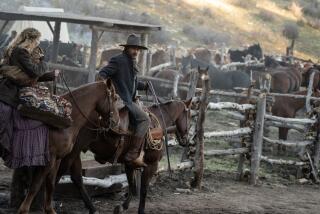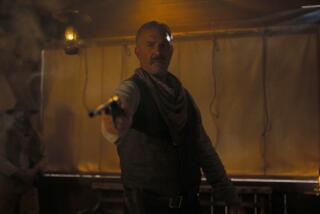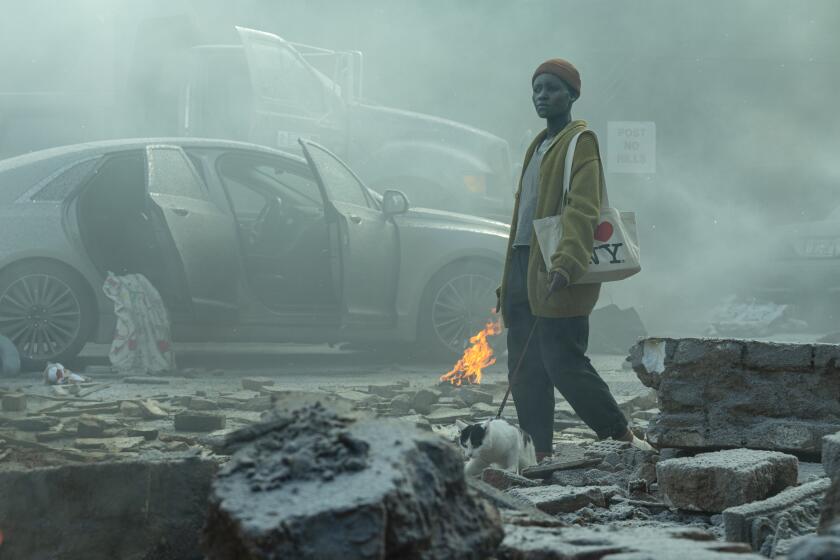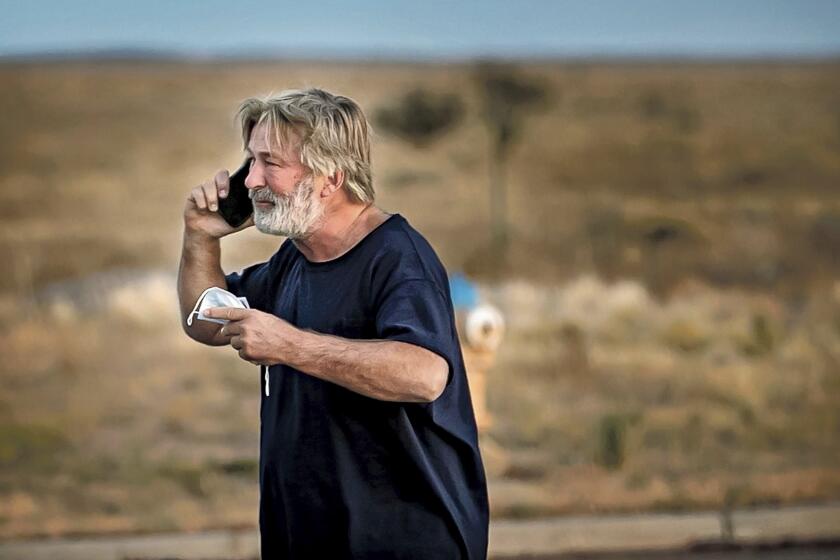MOVIE REVIEW : ‘ISHTAR’--DROLLERY IN THE DESERT
In the guise of a sort of liberal’s rethinking of the Hope-Crosby “Road” movies, Elaine May has created a love letter to show-biz dreamers and called it “Ishtar” (selected theaters). It is a smart, generous, genuinely funny affair. Sometimes, like the camel who almost ambles away with the picture, it’s longish in the tooth, but it is based on an extremely astute vision of life.
Writer-director May suggests that passionate dedication to one’s art in the face of no discernible talent is no sin. Instead, it’s admirable and rather sweet. And certainly “no discernible talent” describes Rogers and Clarke (Warren Beatty and Dustin Hoffman, respectively), her pair of over-the-hill singer/songwriters, whose teaming suggests a man with no life preserver clinging to a man who cannot swim.
As acting partners, however, Beatty and Hoffman are an unselfishly inspired pair, creating character, not schtick. In its first 25 minutes, the movie goes a long way toward cementing our good will, as May fills in with affectionate wit every detail we could want to know about this wildly disparate pair.
The image of the sexually assured Beatty vanishes inside the sweetly oafish Lyle Rogers, a Southern country boy completely in awe of Hoffman’s seemingly assured Chuck Clarke. To Lyle, Chuck is Tom Jones and Barry Manilow rolled into one compact little bundle of talent. For his part, Chuck, who likes to call himself “Hawk,” is content to bask in Lyle’s unquestioning vision of him as an inspired tunesmith, as well as a Manhattan ladies’ man without peer.
Actually, these two shouldn’t be let anywhere near each other: Lyle, who wrote “Hot Fudge Love” while driving an ice-cream delivery truck, and Chuck, author of “There’s a wardrobe of love in my eyes/Try it and see if there’s something your size.” They are already such kindred spirits it’s frightening.
But, hey, how are you gonna stop the meeting of true artists? Soon Rogers and Clarke, spiffed out with bongos, bow ties and natty checked headbands, are hitting the free-audition club circuit, semi-paralyzed with fright but unfortunately still able to play and sing. (On a par with their act are May’s shots of its reception: a young audience, open-mouthed in incredulous horror.)
It does get them an agent, of sorts--the splendidly seedy Jack Weston--and his offer of 10 weeks work in Morocco gets this “Road” movie on the road. The desert entanglements will include Arab revolutionaries, ancient maps, hovering vultures, a beautiful, veiled guerrilla (Isabelle Adjani, impassioned but underemployed) and the omnipresent CIA (Charles Grodin)--the stuff that usually produces dumb-dumb comedy of contrivance.
Yet although the space between laughs--or appreciative chortles, which is closer to “Ishtar’s” consistent level--does get longer once we’re out of sight of New York, May doesn’t get rattled and blow it all. “Ishtar” may have trouble finding the exit signs, but it remains a deadpan comedy of character and observation.
Its stars are on their best behavior. Beatty fleshes out Lyle, that sweet, self-deprecating 20-watt bulb, with a gangling lope and an amazed appreciation for his partner’s quickness: “You can only do that with a small body,” he says wonderingly.
And although May is never ungracious enough to betray Chuck in front of us in New York, Hoffman lets his edge of anxiety whine through like a dentist’s drill. Chuck doesn’t really come into his own until the desert. First, there’s that matchless rush of approval when their nightclub act finally finds its audience. (Never mind that they’re singing “That’s Amore,” not their own songs.) Next, there’s Chuck’s life-saving improvisation at an arms auction, a rapid-speed gibberish routine that reveals a Hoffman with a Danny Kaye-like dexterity and command.
After its superstars, “Ishtar’s” niftiest character is Grodin’s silkenly untrustworthy CIA chief. When properly used--his manic intensity set firmly in reality--the button-eyed Grodin is unparalleled, and this may be his finest hour.
“Ishtar” also remains doggedly endearing. Unlike the 1940s “Road” movies, where squabbles over the girl always threatened to split up Crosby and Hope, Lyle and Chuck have a passionate bond--their (heaven help us) art. And when both of them are deserted by the women in their lives, they really do have each other. You can get all mushy inside when Lyle rescues Chuck from self-destruction--until you realize that Lyle has said, admiringly, “You’d rather have nothing than settle for less.” Logic notwithstanding, it is a tender moment, and that affection permeates the film.
May fills the edges of her screen with quirky filigree work while the plot, such as it is, unfolds center stage. At the American Embassy in Ishtar, an overwrought Beatty pounds the wall for emphasis, and his fist goes right through the cardboard-thin partition. The bureaucratic panic this creates becomes a kind of anthill counterpoint to the action.
Then there’s the blind camel, who begins as a secret password and goes on to be the biggest scene-stealer since Baby Leroy. It might be argued that this witty detailing is sometimes at the expense of the big picture. Agreed. “Lawrence of Arabia” this is not. It’s not even an epic spoof, “Lawrence of Astoria.”
It’s merely an entirely intelligent, drolly funny comedy with something on its mind. It has two exquisitely detailed characters, three lapidary performances, the cinematography of Vittorio Storaro, the costumes of Anthony Powell and the damnedest, most memorably awful songs that Paul Williams and/or Elaine May could devise. And from where I sit, that’s amore.
‘ISHTAR’
A Columbia Pictures release. Producer Warren Beatty. Writer, director Elaine May. Camera Vittorio Storaro. Production design Paul Sylbert. Costumes Anthony Powell. Sound and music coordinator John Strauss. Editors Stephen A. Rotter, William Reynolds, Richard Cirincione. Original songs Paul Williams, May. With Warren Beatty, Dustin Hoffman, Isabelle Adjani, Charles Grodin, Jack Weston, Tess Harper, Carol Kane.
MPAA-rated: PG-13 (parents are strongly cautioned to give special guidance for attendance of children under 13).
Running time: 1 hour, 47 minutes.
More to Read
Only good movies
Get the Indie Focus newsletter, Mark Olsen's weekly guide to the world of cinema.
You may occasionally receive promotional content from the Los Angeles Times.






